|
|
|
Sort Order |
|
|
|
Items / Page
|
|
|
|
|
|
|
| Srl | Item |
| 1 |
ID:
141291


|
|
|
|
|
| Summary/Abstract |
International Relations (IR) theorists have traditionally viewed rationality and consciousness as defining features of human behavior. But recently this approach has come under fire from several angles. Not only do many psychologists now consider rationality to be dependent on emotions, recent developments in the logics of action debate in IR theory explicitly argue for de-emphasizing the role of consciousness and rationality in theorizing agency. In an effort to put rationality back into its proper place, we critique two recent contributions to the logics of action debate: practice theory and the logic of habit. Both logics of action are useful in many respects, but we argue that they rest on a view of individual agency that is too structural and insufficiently cognitive to fully understand how individuals make decisions in international politics. We do not doubt that unconscious reflexes often control individual decisions, but we maintain that cognitive control and deliberation play a much larger role in constructing these reflexes than practice theory and the logic of habit recognize. We sketch a rational intuitionist logic of action for IR theory. We argue that intuitions constitute the most useful way to theorize the unconscious determinants of individual action and that although intuitions control how people behave in particular circumstances, they are subject to rational recalibration through internal and intersubjective reasoning.
|
|
|
|
|
|
|
|
|
|
|
|
|
|
|
|
| 2 |
ID:
179415
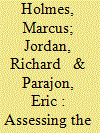

|
|
|
|
|
| Summary/Abstract |
The study of microfoundations, especially individuals, is enjoying a renaissance in international relations (IR) scholarship. Yet, this rise is more difficult to find in publication data. Using the Teaching, Research, and International Policy (TRIP) journal-article database, we show that only 13.7% of IR articles in 12 leading journals use the first image. This proportion remains approximately the same from 1980 through 2018. Interrogating the data, we show that this distribution does not stem from epistemological or methodological commitments, such as positivism, quantitative analysis, or formal modeling. We suggest several reasons for this apparent disjuncture between qualitative assessments of the rebirth of first-image theorizing and the quantitative data that imply a slower or perhaps more limited return.
|
|
|
|
|
|
|
|
|
|
|
|
|
|
|
|
| 3 |
ID:
146154
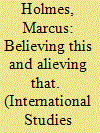

|
|
|
|
|
| Summary/Abstract |
Rationalist models of decision making typically follow the general form of desire + belief = action. But determining an actor's beliefs and desires often proves challenging. One set of theories turns to psychology—and in particular emotions—to uncover how emotions help to shape and strengthen beliefs. Some of this work establishes a fit between emotions and the rationalist paradigm. It holds that emotions account for more than irrational behaviors; they also serve as a source of rational belief. Feeling, it claims, is believing. I argue that if actors belive in the reasonability of their feelings, then this move is warranted. But a range of behavior defies this logic. Instead, I suggest that actors often find themselves torn between contradictory affective intuitions, on the one hand, and rational beliefs, on the other. In consequence, they hold rational beliefs, but their resulting behavior qualifies as irrational. I apply existing work on the distinction between belief and alief to make sense of this phenomenon. I illustrate my claims through a rereading of the security dilemma—where irrational intuitions, in conjunction with rational beliefs, fuel conflict.
|
|
|
|
|
|
|
|
|
|
|
|
|
|
|
|
| 4 |
ID:
124395
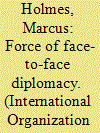

|
|
|
|
|
| Publication |
2013.
|
| Summary/Abstract |
Face-to-face diplomacy has long been the lynchpin of international politics, yet it has largely been dismissed as irrelevant in theories of cooperation and conflict-as "cheap talk" because leaders have incentives to dissemble. However, diplomats and leaders have argued for years that there is often no substitute for personally meeting a counterpart to hash out an agreement. This article argues that face-to-face diplomacy provides a signaling mechanism that increases the likelihood of cooperation. Face-to-face meetings allow individuals to transmit information and empathize with each other, thereby reducing uncertainty, even when they have strong incentives to distrust the other. The human brain has discrete architecture and processes devoted to parsing others' intentions via cues in face-to-face interaction. These processes enable actors to directly access the intentions of others with a higher degree of certainty than economic and game-theoretic models of bargaining predict.
|
|
|
|
|
|
|
|
|
|
|
|
|
|
|
|
| 5 |
ID:
132374
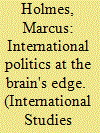

|
|
|
|
|
| Publication |
2014.
|
| Summary/Abstract |
Social neuroscience has seen a profound rise in other social science disciplines, such as economics, yet there has been relatively little systematic analysis of the usefulness of social neuroscience for international relations and the study of world politics. This article suggests that while there are many potential explanations for why this might be the case, one important barrier to adopting neuroscience may be our metaphysical assumptions and philosophical wagers. I suggest that if all politics is rooted in the brain, then two distinct arguments regarding agent-structure are plausible. One argument suggests that structure becomes redundant once the brain is accounted for; the other suggests that the brain simply drops out as epiphenomenal. After all, if all politics is reflected in the brain, then the brain itself is less interesting than the structure being reflected. These wagers ultimately relate to positions we take on the mind-body problem and well-known ideational-material divide. New research in neuroscience and philosophy of mind suggests that this binary distinction can be overcome, suggesting a new "via media" between ideas and material that may offer significant promise for both theory and practice.
|
|
|
|
|
|
|
|
|
|
|
|
|
|
|
|
| 6 |
ID:
153918
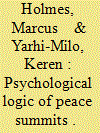

|
|
|
|
|
| Summary/Abstract |
Why do some peace summits succeed while others fail? We offer an explanation that highlights the importance of empathy between leaders. Studies in negotiations and psychology show that empathy—the ability to take the perspective of others and understand their cognitive and affective states without necessarily sympathizing with them—is critical in overcoming biases, transcending long-held enmities, and increasing the likelihood of cooperation. We show that empathy is perceptual in nature. Actors can convey it through both words and expressive behaviors in face-to-face interactions. From these, leaders gain an understanding of whether the other side is willing to negotiate in good faith and what a potential agreement might look like. Additionally, we argue that all is not lost if the leaders of warring states prove unable to cultivate these beliefs about each other. A skilled mediator can step in and build relational empathy between disputants. We assess the empirical ramifications of conveyed and relational empathy by comparing two of the most salient Middle East peace process summits with divergent outcomes: success at Camp David 1978 and failure in 2000.
|
|
|
|
|
|
|
|
|
|
|
|
|
|
|
|
| 7 |
ID:
197118


|
|
|
|
|
| Summary/Abstract |
This article explores the nuanced interplay between artificial intelligence (AI) and human decision making in the high-stakes arena of nuclear crisis management. We argue that AI, despite its lack of emotional intelligence and experiential learning, presents unique opportunities to enhance decision-makers’ ability to navigate the complexities of nuclear crises. By juxtaposing AI's data-driven insights with human intelligence's depth in emotional and creative processes, we illustrate the complementary roles each can play in fostering empathy, understanding, and, ultimately, security dilemma sensibility (SDS). Through theoretical exploration and thought experiments on historical crises such as the Cuban Missile Crisis and the Able Archer incident, we demonstrate AI's potential in mitigating misperceptions and facilitating informed, empathetic responses that acknowledge the fears and intentions of adversaries. However, we also highlight the inherent limitations and ethical considerations of over-relying on AI, stressing the irreplaceable value of human judgment and the need for a balanced approach that leverages the strengths of both AI and human intelligence. Our conclusion underscores the importance of integrating AI as a tool within a broader strategy of crisis management that prioritises trust-building and direct communication among decision-makers to navigate the delicate dynamics of international security and diplomacy effectively.
|
|
|
|
|
|
|
|
|
|
|
|
|
|
|
|
| 8 |
ID:
103998
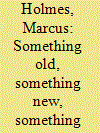

|
|
|
|
|
| Publication |
2011.
|
| Summary/Abstract |
There are many stories to be told regarding the development of International Relations (IR) theory in the United States over the last century. Some have pointed out IR's evolutionary properties, emphasizing the debates that have produced fitter theory with empirical reality. Others have argued that the development has been largely scientific with knowledge built hierarchically through time. In this article, I propose an alternative view of American IR's development. Specifically, I argue that IR theory is best understood through heterarchical organization, with core ideas and concepts rerepresented in new ways, and various levels of analysis, over time. In making this argument I trace duel processes of borrowing ideas from other disciplines and rerepresenting those ideas in new forms in order to solve vexing theoretical problems. The article demonstrates how conceptions of anarchy have been significantly affected by other disciplines and relates those conceptions to views of international security both at home and abroad, particularly in the Asia-Pacific region.
|
|
|
|
|
|
|
|
|
|
|
|
|
|
|
|
| 9 |
ID:
150484
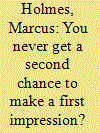

|
|
|
|
|
| Summary/Abstract |
A common assumption in international relations (IR) theory is that threat perception involves the very deliberate and painstaking task of processing information. Costly signals, movements toward rapprochement, conciliatory gestures, speech acts, intentioned behavior, and other actions are interpreted and consciously analyzed in order to answer the simple question: Does the relevant actor pose a threat? Yet, a wealth of evidence from psychology and neuroscience suggests that rather than consciously evaluating others, we tend to make quick judgments within milliseconds of meeting. First impressions, it turns out, are critical to judgments of threat as well as trustworthiness. And crucially, first impressions are sticky in that they last long into a relationship and color future interactions. This article elaborates this cognitive bias in IR threat perception, posits a theory of first impressions at the individual level of analysis, and outlines its importance in diplomacy. In particular, I connect the literature on first impressions to the problem of first encounters in constructivist theorizing, suggest links to the proliferation of symbolic violence, and find an antidote to symbolic violence in the practice of digital diplomacy.
|
|
|
|
|
|
|
|
|
|
|
|
|
|
|
|
|
|
|
|
|